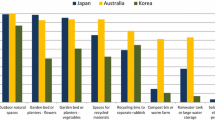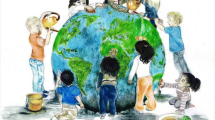Abstract
Integrating basic principles, values, and practices of education for sustainability in early childhood education (ECE) is important for developing and developed countries. In this context, there is a need to identify and evaluate indicators that measure sustainable practices in ECE programs. This study was conducted in 18 preschools in Turkey to provide statistical analyses of the sustainability indicators. OMEP Environmental Rating Scale for Sustainable Development in Early Childhood with three subscales for sustainability (economic, environmental, and sociocultural) was utilized as the data collection tool. The reliability analyses are framed on generalizability theory, which identifies the sources of variation across schools, raters, and indicators on the three subscales. The study finds that the sustainability indicators can be redefined and adapted to be employed in the Turkish context as a way to ensure more reliable measurement of sustainability practices in early childhood education settings.
Résumé
L’intégration de principes, valeurs et pratiques relevant d’éducation au développement durable (EDD) en éducation de la petite enfance (ÉPE) est importante dans les pays développés et dans les pays en développement. Dans ce contexte, il est nécessaire d’identifier et d’évaluer les indicateurs mesurant les pratiques de développement durable dans les programmes d’ÉPE. Cette étude a été réalisée dans 18 maternelles de Turquie afin d’apporter des analyses statistiques sur les indicateurs de durabilité. L’outil de collecte de données utilisé est l’Échelle d’évaluation de l’environnement pour le développement durable en éducation préscolaire de l’OMEP (ERS-SDEC) à trois sous échelles (durabilité économique, environnementale et socioculturelle). L’analyse de fiabilité dans le cadre de la théorie de la généralisabilité identifie les sources de variations entre les écoles, les évaluateurs et les indicateurs aux trois sous échelles. Il est recommandé que les indicateurs de durabilité soient redéfinis et adaptés pour utilisation dans le contexte turc afin d’assurer une mesure plus fiable des pratiques de développement durable dans les contextes d’éducation de la petite enfance.
Resumen
La integración de principios, prácticas y valores básicos de la Educación Sostenible (EfS, abreviatura en inglés) en la Educación Preescolar (ECE, abreviatura en inglés) resulta importante para los países desarrollados y en vías de desarrollo. En este contexto, existe la necesidad de identificar y evaluar indicadores que midan prácticas sostenibles en los programas de Educación Preescolar. El presente estudio se llevó a cabo en 18 escuelas de preescolar en Turquía con el fin de brindar un análisis estadístico de los indicadores de sostenibilidad. La herramienta de medición de datos que se utilizó fue la Escala de Valoración Ambiental para el Desarrollo Sostenible en la Educación Preescolar de la OMEP (ERS-SDEC, abreviatura en inglés) con tres sub-escalas: sostenibilidad económica, ambiental y socio-cultural. El análisis de fiabilidad dentro del marco de la Teoría de Generalidad identifica las fuentes de variación en las diferentes escuelas, medidores e indicadores en las tres sub-escalas. Se recomienda redefinir y adaptar los indicadores de sostenibilidad al contexto de Turquía para así asegurar una medición más fiable de las prácticas de sostenibilidad en ambientes de educación preescolar.
Similar content being viewed by others
References
Brennan, R. L. (2001). Generalizability theory. New York: Springer.
Brundtland, G. (1987). Report of the world commission on environment and development: our common future. New York: United Nations. Retrieved from http://www.un-documents.net/our-common-future.pdf. Accessed 1 Nov 2011.
Cardinet, J., Johnson, S., & Pini, G. (2010). Applying generalizability theory using EduG. New York: Routledge.
Cronbach, L. J., Gleser, G. C., Nanda, H., & Rajaratnam, N. (1972). The dependability of behavioral measurements: Theory of generalizability for scores and profiles. New York: Wiley.
Davis, J., Engdahl, I., Ottieno, L., Pramling Samuelsson, I., Siraj-Blatchford, J., & Vallabh, P. (2009). Early childhood education for sustainability: Recommendations for development. International Journal of Early Childhood,42(2), 113–118.
Duncan, E. (2011). Education for sustainable development in practice: Report Part 2—ESD in practice. Oslo: OMEP (Organisation Mondiale Pour L’Éducation Préscolaire).
Engdahl, I., & Rabušicová, M. (2011). Education for sustainable development in practice: A report for the OMEP world assembly and conference on the OMEP WORLD ESD project 2010–2011. Retrieved from http://old.worldomep.org/files/1343134_wa-report-omep-esd-in-practice-2011-1-.pdf. Accessed 14 Nov 2017.
Güvendir, A. M., & Güvendir, E. (2017). The determination of an English speaking exam’s data reliability using generalizability theory. Trakya University Journal of Education Faculty,7(1), 1–9.
Haktanır, G., Güler Yıldız, T., & Kahriman, D. (2016). Education for sustainable development in Turkey. In J. Siraj-Blatchford, C. Mogharreban, & E. Park (Eds.), International research on education for sustainable development in early childhood (pp. 139–153). Heidelberg: Springer.
Haktanır, G., Pramling Samuelsson, I., Davis, J., & Siraj-Blatchford, J. (2012). Teacher education and sustainable development. In Symposium conducted at the meeting education for sustainable development. Göteborg: Sweden.
Henderson, K., & Tilbury, D. (2004). Whole-school approaches to sustainability: An international review of sustainable school programs. Report. Australian Research Institute in Education for Sustainability (ARIES) for the Department of the Environment and Heritage, Canberra, ACT: Australian Government.
Hesterman, S., Wang Guangheng, X. Z., Huggins, V., Macharia, M. M., Park, E., Assuncaofolque, M., Moloi, T., Pramling Samuelsson, I., Kahriman, D., & Siraj-Blatchford, J. (2015). Providing high quality education for sustainable development practice in making ESD RatingScale (ERS-SDEC) handbook. In Symposium conducted at OMEP Seoul workshop. Seoul, South Korea.
Inoue, M., O’Gorman, L., & Davis, J. (2016). Investigating early childhood teachers’ understandings of and practices in education for sustainability in Queensland: A Japan–Australia research collaboration. Australian Journal of Environmental Education,32(2), 174–191. https://doi.org/10.1017/aee.2016.
Kahriman, D., & Olgan, R. (2018). Teacher practices and preschool physical environment for education for sustainable development: eco vs ordinary preschools. Mersin University Journal of the Faculty of Education,14(2), 669–683.
Kahriman-Öztürk, D., Olgan, R., & Güler, T. (2012). Preschool children’s ideas on sustainable development: How preschool children perceive three pillars of sustainability with the regard to 7R. Educational Sciences: Theory & Practice—Special Issue,12, 2987–2995.
Kahyaoğlu, M. (2016). A study on environmental education research in Turkey: A content analysis study. Marmara Geographical Review,34, 50–60.
Kalaitzidis, D. (2012). Sustainable school indicators: Approaching the vision through the sustainable school award. Journal of Teacher Education for Sustainability,14(2), 168–180.
Korkmaz, A., & Güler Yıldız, T. (2017). Assessing preschools using the eco-schools program in terms of education for sustainable development in early childhood education. European Early Childhood Education Research Journal,25(4), 595–611. https://doi.org/10.1080/1350293X.2017.1331074.
Pramling Samuelsson, I. (2011). Why we should begin early with ESD: The role of early childhood education. International Journal of Early Childhood,43(2), 103–118.
Pramling Samuelsson, I. P., & Kaga, Y. (2008). The contribution of early childhood education to a sustainable society. Paris: UNESCO. Retrieved from https://unesdoc.unesco.org/ark:/48223/pf0000159355. Accessed 18 July 2011.
Shavelson, R. J., & Webb, N. M. (1991). Generalizability theory: A primer. Newbury Park, CA: SAGE Publications.
Siraj-Blatchford, J., Heggen, M. P., Haktanır, G., Güler, T. &Pramling-Samuelsson, I. (2013). OMEP education for sustainable development (ESD) Rating Scale: Part two. In Symposium conducted at the meeting OMEP 65th World Congress, Shanghai, China. OMEP.
Siraj-Blatchford, J., & Pramling-Samuelsson, I. (2016). Education for sustainable development in early childhood care and education. In J. Siraj-Blatchford, E. Park, & C. Mogharreban (Eds.), International research on education for sustainable development in early childhood (pp. 1–15). Amsterdam: Springer. https://doi.org/10.1007/978-3-319-42208-4_10.
TEMA (Turkish Foundation for Combating Soil Erosion, for Reforestation and the Protection of Natural Habitats). (2018). Education programs of the Turkish Foundation for combating soil erosion, for reforestation and the protection of natural habitats. Retrieved from http://www.tema.org.tr/e-tema.org. Accessed 20 Feb 2019.
UNESCO. (2005). United Nations decade of education for sustainable development (2005–2014). Paris: UNESCO. Retrieved from http://portal.unesco.org/education/admin/ev.php. Accessed 10 Mar 2010.
UNESCO. (2007). Education for sustainable development. Retrieved from http://portal.unesco.org/education/en/ev.phpURL_ID=27542&URL_DO=DO_. Accessed 12 July 2015.
UNESCO. (2008). The Gothenburg recommendations on education for sustainable development. Goteborg, Sweden. Retrieved from http://omep.vrserver2.cl/cgibin/procesa.pl?plantilla=/archivo.html&bri=omep&tab=a_6. Accessed 24 Jan 2011.
United Nations (UN). (2015). Transforming our world: The 2030 agenda for sustainable development (A/566 Res/70/1). New York: UN General Assembly. Retrieved from http://sustainabledevelopment.un.org. Accessed 26 Oct 2017.
Author information
Authors and Affiliations
Corresponding author
Additional information
Publisher's Note
Springer Nature remains neutral with regard to jurisdictional claims in published maps and institutional affiliations.
Appendix: Summary of Means and Standard Deviation Scores of Indicators
Appendix: Summary of Means and Standard Deviation Scores of Indicators
Subscales | Rater | No. of indicators | M | SD | Levels |
|---|---|---|---|---|---|
Environmental sustainability | 1 | 4 | 5.78 | 1.07 | Good |
4 | 5.64 | 1.02 | Good | ||
4 | 4.67 | 1.22 | Good | ||
2 | .39 | .10 | Inadequate | ||
1 | 1.65 | .24 | Inadequate | ||
2 | 4 | 5.64 | 1.20 | Good | |
4 | 6.17 | .92 | Good | ||
4 | 5.10 | 1.13 | Good | ||
2 | .63 | .18 | Inadequate | ||
1 | 1.75 | .25 | Inadequate | ||
Economical sustainability | 1 | 4 | 4.72 | 1.14 | Good |
4 | 3.26 | 1.30 | Minimal | ||
4 | 1.60 | .53 | Inadequate | ||
3 | 1.60 | .46 | Inadequate | ||
2 | 2.04 | .59 | Minimal | ||
2 | 4 | 5.15 | 1.17 | Good | |
4 | 3.60 | 1.24 | Minimal | ||
4 | 2.19 | .82 | Minimal | ||
3 | 1.12 | .68 | Inadequate | ||
2 | 2.92 | .64 | Minimal | ||
Sociocultural sustainability | 1 | 4 | 2.87 | 1.03 | Minimal |
4 | 2.67 | 1.05 | Minimal | ||
4 | 3.16 | 1.32 | Minimal | ||
3 | 1.99 | .58 | Inadequate | ||
1 | 1.65 | .24 | Inadequate | ||
2 | 4 | 3.21 | 1.12 | Minimal | |
4 | 2.58 | 1.21 | Minimal | ||
4 | 3.84 | 1.10 | Minimal | ||
3 | 1.85 | .41 | Inadequate | ||
1 | 1.65 | .24 | Inadequate |
Rights and permissions
About this article
Cite this article
Kahriman-Pamuk, D., Uzun, N.B., Yıldız, T.G. et al. Reliability of Indicators Measuring Early Childhood Education for Sustainability: A Study in Turkey Using Generalizability Theory. IJEC 51, 193–206 (2019). https://doi.org/10.1007/s13158-019-00243-6
Published:
Issue Date:
DOI: https://doi.org/10.1007/s13158-019-00243-6




